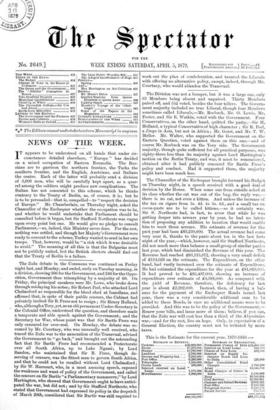The Division was not a bumper, but it was a
large one, only 63 Members being absent and unpaired. Thirty Members paired off, and 552 voted, besides the four tellers. The Govern- ment majority included no true Liberal, though four Members sometimes called Liberals,—Mr. Roebuck, Mr. 0. Lewis, Mr. Foster, and Sir E. Watkin, voted with the Government. Four Conservatives, on the other hand, quitted the party,—Sir H. Holland, a typical Conservative of high character ; Sir R. Peel, a Jingo in Asia, but not in Africa ; Mr. Gorst, and Mr. T. W. Mellor. Mr. Walter, who supported, the Government on the Eastern Question, voted against them on this one,—and of course Mr. Roebuck was on the Tory side. The Government majority, though quite sufficient for all practical purposes, was eighty-three less than its majority against Lord Hartington's motion on the Berlin Treaty, and was, it must be remembered, obtained after it had publicly censured Sir Bartle Frere's policy and conduct. Had it supported them, the majority might have been much less.


































